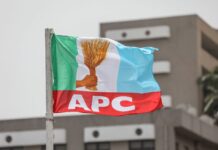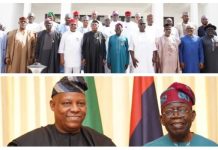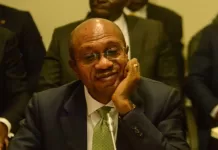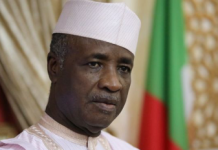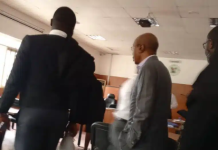The 2023 presidential, governorship and parliamentary elections conducted by the Independent National Electoral Commission (INEC) was no different from the typical Nigerian election.
Just like every other election in Nigeria, it was filled with drama and suspense, spiced with enough action, you may decide to add violence (if you so wish).
Here, we take a look at different controversial court judgments in Nigeria in 2023.
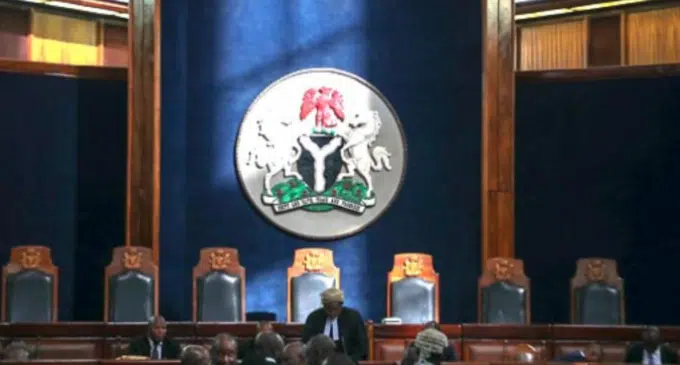
The electoral process was widely condemned by political actors who filed court cases over claims of stolen mandates.
In fact, INEC in October revealed that it was faced with over 1,000 pre-election litigations in the buildup to the 2023 elections.
Following the court cases, the pronouncements and verdicts of judges have come under public scrutiny.
Apart from electoral-related cases, there are other controversial court judgments in 2023.
Here are some of the major and controversial court judgments of the year:
AKPABIO’S ‘MIRACULOUS’ EMERGENCE AS SENATOR FOR AKWA IBOM NORTH-WEST
The supreme court judgment which affirmed Godswill Akpabio as the elected senator for Akwa Ibom north-west senatorial district on January 20, was received by many Nigerians as a surprise.
Akpabio contested for the presidential ticket of the All Progressives Congress (APC) Udom Ekpoudom, a former deputy inspector-general of police (DIG), had won the party’s primary for the Akwa Ibom north-west district.
However, after losing out in the race to secure the presidential ticket, the party conducted another primary poll which miraculously produced Akpabio as the winner.
The Challenge
The APC and Akpabio went before the federal high court to challenge INEC’s decision not to enlist any candidate for the senatorial district ahead of the general election.
While they got a favourable ruling at the trial court, the appellate court, on November 14, quashed the judgment.
They sacked Akpabio as the candidate of the party.
However, the apex court in its judgment held that the issue was an internal party affair which stripped the appeal court of jurisdiction to hear the matter.
NAIRA REDESIGN POLICY
On March 3, the supreme court invalidated the naira redesign policy introduced by the Central Bank of Nigeria (CBN).
The redesigned naira notes were unveiled on December 23, 2022.
The deadline for the implementation of the policy was fixed for January 31, 2023, but it was further extended to February 10.
However, the policy was challenged in court by some state governors.
In its judgment, a seven-member panel of the apex court held that the old ₦200, ₦500 and ₦1000 notes would remain legal tender until December 31, 2023.
The supreme court faulted the entire policy of the CBN, saying the timing and implementation were defective.
Also, the December 31 deadline has been extended indefinitely.
NATASHA BECOMES KOGI’S FIRST FEMALE SENATOR
Having contested three different elections in Kogi state since 2019, Natasha Akpoti-Uduaghan’s efforts to serve the people of the state came to fruition in October.
It was after a judgment by the court of appeal in Abuja.
The court declared her as the senator representing Kogi-central senatorial district.
After the February 25 election, INEC announced Abubakar Sadiku-Ohere of the APC as winner — by a margin of 369 votes.
Dissatisfied with the outcome of the election, Akpoti-Uduaghan, candidate of the PDP, approached the National Assembly Election Petition Tribunal.
The aim was to nullify the poll over alleged “irregularities”.
Judgement
In September, the three-member panel sitting in Lokoja, the state capital, said Ohere’s results were inflated in nine polling units in Ajaokuta LGA.
Kemakolam Orjiako, the tribunal chairman, added that INEC omitted the results of three other polling units meant for Akpoti-Uduaghan in the same LGA.
After necessary corrections were made, the court declared Akpoti-Uduaghan as the winner of the election.
Akpoti won with 54,074 votes, as against Ohere who garnered 51,291 votes.
Not contented with the judgment, Ohere headed to the appellate court to seek redress.
But the court dismissed his appeal for lacking in merit and declared Akpoti-Uduaghan the winner.
SUPREME COURT OKAYS CONTINUATION OF NNAMDI KANU’S TRIAL
Since 2021 when the trial of Nnamdi Kanu, leader of the proscribed Indigenous People of Biafra (IPOB) began, several cases have been filed against him and several judgments were given — but there is no finality yet.
Following his extradition from Kenya, Kanu is being held in the custody of the Department of State Services (DSS).
Have You Read: Likely Person To Become Aiyedatiwa’s Deputy In Ondo
This is as the federal government filed terrorism charges against him.
In April 2022, the Federal High Court struck out eight of the 15 charges against the IPOB leader.
The remaining seven counts were later quashed by the court of appeal on October 13, 2022.
The judge ordered that Kanu be released.
Stay Of Execution
A few days later, the court granted a stay of execution on its verdict discharging Kanu, after the federal government filed an appeal at the supreme court.
Delivering judgment on December 15, the apex court reversed the verdict of the appeal court.
In a unanimous decision, the five-member panel held that even though the federal government acted “irresponsibly” by forcefully bringing Kanu back to the country from Kenya, no legislation prevents the trial court from continuing with the case.
Till now, Nnamdi Kanu is still in detention.
NNPP LOSES ONLY GUBER SEAT AS COURT SACKS ABBA YUSUF AS KANO GOVERNOR
The nullification of Abba Yusuf’s election as governor of Kano State is probably one of the most controversial court decisions of 2023.
Yusuf was the candidate of the New Nigeria Peoples Party (NNPP). Also, he was the only elected governor on the platform of the party in the 2023 elections.
After deducting 165,663 votes from the 1,019,602 recorded for Yusuf, the tribunal, in September, sacked Yusuf and affirmed Nasiru Gawuna of the APC, as the winner of the poll.
The tribunal held that the ballot papers (165,663) were not stamped, signed and dated as required by law.
This decision of the tribunal was also affirmed by the court of appeal on November 17.
The appellate court added that Yusuf was not a member of the NNPP when he contested the election.
Controversy
However, controversy trailed the verdict days later when a certified true copy (CTC) of the appeal court’s judgment surfaced. It contradicts the November 17 ruling.
The copy of the judgment ruled against and in favour of the NNPP candidate simultaneously. This finding elicited outrage on social media platforms and the streets.
The appeal court issued a statement hours later, blaming “clerical error” for the contradictions or discrepancies.
The matter is now before the supreme court awaiting judgment.
TINUBU AFFIRMED AS NIGERIA’S PRESIDENT
On October 26, the supreme court laid to rest, all legal disputes challenging Bola Tinubu’s election as Nigeria’s president.
Tinubu was declared the winner of the presidential election with 8,794,726 votes.
Atiku Abubakar of the PDP came second with 6,984,520, ahead of Peter Obi, the candidate of the Labour Party (LP). Peter Obi polled 6,101,533 votes.
Initially, five political parties had filed petitions against Tinubu’s election, but the Action Peoples Party (APP) and the Action Alliance (AA) withdrew from the litigation.
Left in the struggle of challenging Tinubu’s mandate were the PDP, LP and Action Peoples Movement (APM) challenging Tinubu’s mandate.
Amongst the issues raised, the petitioners contended that Tinubu did not score a majority of lawful votes cast in the election and did not get 25% of votes cast in the FCT.
The Allegations
They also contended that the APC candidate was indicted for drug trafficking offences in the United States.
Also Read: Aiyedatiwa Reveals Tinubu’s Response To Akeredolu’s Death
It was further alleged that Tinubu held dual citizenship and that his vice-presidential candidate, Kashim Shettima had a double nomination.
An allegation that the president had forged his Chicago State University (CSU) certificate was another issue that elicited wide controversy.
Atiku went as far as filing another suit in the US seeking to compel CSU to produce Tinubu’s certificate.
However, all the issues raised in the separate appeals were thrown out by a five-member panel of the tribunal. The final decisionw as made on September 6.
The decision of the tribunal was also affirmed by the supreme court, putting to rest every push to unseat Tinubu.

